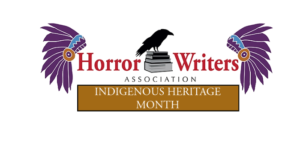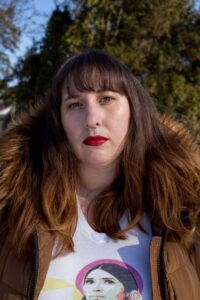Indigenous Heritage in Horror Month: Interview with Alicia Elliott

Alicia Elliott is an award-winning Mohawk writer and editor living in Brantford, Ontario. Her bestselling first book, A Mind Spread Out on the Ground, was nominated for the Hilary Weston Writers’ Trust Prize for Nonfiction. And Then She Fell is her first novel.

Photo Credit: Alex Jacobs-Blum
What inspired you to start writing?
This isn’t a particularly unique writing origin story, but it started with loving reading. Books were a break from the difficulties of my everyday life, which as a child was full of things I didn’t understand. But I understood the emotions of the protagonists I read about – I loved them, cried with them, mourned with them. From an early age, I wanted to create that sort of experience for others that meant so much to me.
What was it about the horror genre that drew you to it?
There is something so beautiful about a genre that allows us to fully feel our fears, to give space to our trauma and pain, and bring us to catharsis. That’s what horror does for me, and why I think it means so much to people from marginalized communities, to whom some peoples’ horror stories are their everyday lived experiences. But the best part about horror, to me, is that after all the tension leading up to the scare or the kill, there is actually a release. That isn’t always something we all experience with the fears and traumas we face and carry in our everyday lives – that release. Instead, we have to continue to carry it without any guarantee we’ll ever be able to put it down. Horror is in some ways, then, a sort of weird wish fulfillment, because in the world of horror, the fears we all carry are not only validated as being actually worthy of that fear but are also able to be put down once the story is finished. I love how horror takes our traumas and fears and allows us to look them in the eye, and then place them down. It offers us catharsis that life often can’t.
Do you make a conscious effort to include Indigenous characters and themes in your writing and if so, what do you want to portray?
Being Indigenous myself, I’m very aware that most peoples’ limited, often racist understanding of my people was through poor, limited, often racist representation via the media. Westerns with marauding, murdering Indians, horror movies like Poltergeist and Cannibal Holocaust, etc. To reverse that, we as Indigenous writers need to use the very medium that was originally used to dehumanize us – media – to instead humanize us. To show us as we really are, in all our complexity. For me, that means I want to include humour in my horror since the Indigenous women I know are the funniest women with the biggest laughs. It was important in And Then She Fell, too, for me to portray the experience of psychosis through the lens of Indigeneity since most art about insanity is from a white, Western lens. Someone being crazy is the surprise reveal at the end, instead of being shown as a unique experience worth exploring beyond that shock factor.
What has writing horror taught you about the world and yourself?
My first book was nonfiction, so I’m very aware of how that genre can create empathy and understanding. But when you’re writing nonfiction from the perspective of a person who has psychosis, as I did, readers’ perceptions of who you are change immediately. You’re “crazy”; you’re an unreliable narrator; you have nothing to teach anyone; you need to be protected from yourself; they don’t believe you. When you instead use horror, readers’ guards aren’t up in the same way. They are more willing to believe a fictional character like Alice as she explains what she’s experiencing than they would be to believe a real person like me. Horror allows us to sneak understanding and education to our audience, getting readers to see and feel viscerally along with the characters things they may not even give time to, much less understanding to, in real life.
How have you seen the horror genre change over the years? And how do you think it will continue to evolve?
When there have been decades of zero representation or books written by marginalized perspectives, then having a handful all of a sudden can make people think there’s far more change than there really has been. After all, going from zero to six horror books by Indigenous authors published in a year, for example, seems like a big deal when expressed as a percentage in a way it does not seem impressive at all when we call it six books.
Unfortunately, I think the success and visibility of a select few Indigenous horror authors can trick people into thinking things have changed dramatically when they actually haven’t. I’m glad that there are those few, but I think we need to have far more Indigenous editors in publishing to really make changes – and they need to have the support of publishers. I hope that Indigenous women, both cis and trans, and nonbinary people get their stories not only published but embraced and promoted by the horror community. I don’t believe there’s only room for a few of us. That cliché certainly isn’t applied to white men who write horror, so why should it be the case for Indigenous women and nonbinary folks? I can’t say for sure that this will happen, but I hope it will, and I will work to create that evolution.
How do you feel the Indigenous community has been represented thus far in the genre and what hopes do you have for representation in the genre going forward?
The most notable representation Indigenous people have had in horror has not even been as people, but as dead bodies buried in an “Indian burial ground.” I’ve always been fascinated by this, as it actually does kind of bring up the genocidal history of the country, which is literally all an “Indian burial ground.” However, this trope often conveniently leaves out how those Indians died. Who killed them? Who stole their land? Who made sure they suffered? What government decisions were made – and by whom – to ensure that most Indians possibly died so America could live? Those Indians mentioned in those burial grounds don’t even get to appear as ghosts to haunt the “innocent” white families that appear as our protagonists. Families, I’ll add, who are as oblivious to the existence of the burial grounds as they are to the history of this country. So there is no moment of realization – even our dead bodies that supposedly cause hauntings are just props, stripped of context and humanity. I’m most excited about what we as Indigenous writers have to say about this history. I want to see all the weirdest, wildest shit that Indigenous writers can do to really fuck with representation. I don’t want to see perfect protagonists – I want to see messy ones that I recognize because they remind me of my cousins.
Who are some Indigenous horror authors you recommend our audience check out?
I am obsessed with Jessica Johns’s Bad Cree. I also love Cherie Dimaline and how she makes sure her horror books are also funny and sexy. Andrea Rogers’ Man-Made Monsters is great. I loved Ramona Emerson’s Shutter. Waubgeshig Rice, Jamesie Fournier, Francine Cunningham, Tiffany Morris and Shane Hawk are all fantastic writers who everyone should be reading. And, obviously, Stephen Graham Jones is just a living legend at this point, so if you don’t already have a bunch of his books, I seriously question your judgment.
What is one piece of advice you would give horror authors today?
Have fun with it! So many parts of the editing publishing and promoting process are boring at best and awful at worst, so just allow yourself to really have fun when it’s still only you and the words.
And to the Indigenous writers out there who are just getting started, what advice would you give them?
Don’t compromise on your vision. If an editor or publisher or agent doesn’t get it and wants you to tone things down, explain to them why it’s so important to keep your work fearless. If they don’t understand after that, they probably won’t be the right fit for you and will ask you to continue to compromise until you don’t even recognize your work. You don’t need to do that. People worth working with would never ask you to do that. So don’t.



